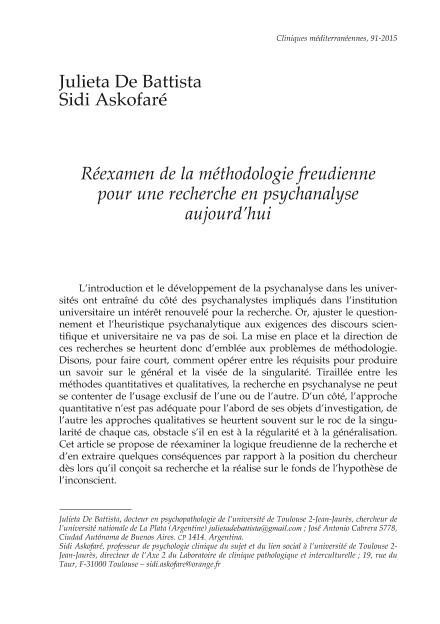Artículo
L’introduction et le développement de la psychanalyse dans les universités ont entraîné du côté des psychanalystes impliqués dans l’institution universitaire un intérêt renouvelé pour la recherche. Or, ajuster le questionnement et l’heuristique psychanalytique aux exigences des discours scientifique et universitaire ne va pas de soi. La mise en place et la direction de ces recherches se heurtent donc d’emblée aux problèmes de méthodologie. Disons, pour faire court, comment opérer entre les réquisits pour produire un savoir sur le général et la visée de la singularité. Tiraillée entre les méthodes quantitatives et qualitatives, la recherche en psychanalyse ne peut se contenter de l’usage exclusif de l’une ou de l’autre. D’un côté, l’approche quantitative n’est pas adéquate pour l’abord de ses objets d’investigation, de l’autre les approches qualitatives se heurtent souvent sur le roc de la singularité de chaque cas, obstacle s’il en est à la régularité et à la généralisation. Cet article se propose de réexaminer la logique freudienne de la recherche et d’en extraire quelques conséquences par rapport à la position du chercheur dès lors qu’il conçoit sa recherche et la réalise sur le fonds de l’hypothèse de l’inconscient. The article is part of a wider field of research methodology in the human sciences and proposes a reflection on the Freudian contribution from the review of some statements concerning the differences between the researcher`s position and the analyst’s position. This reflection allows for a critical reading of Freud`s research work steps and proposes as a problematic topic the inclusion of the unconscious in the researcher work. The question that arises is : what does the analyst do when he’s doing research ? Does he use his unconscious as a research tool ? Does he trust the domain of the unconscious in the development of the plot ? The inclusion of the dimension of the unconscious in the reflection on the methodology of research in psychoanalysis can rethink possible « blind spots » of the researcher, which appear in the form of presuppositions and prejudices. This inclusion also clarifies another dimension of the research : the originality of the findings. The article concludes that the research analyst introduces a new conception of objectivity in research : a subjectivity criticized because he considers the role of the unconscious of the researcher in the production of knowledge.
Réexamen de la méthodologie freudienne pour une recherche en psychanalyse aujourd'hui
Título:
Reconsideration of Freudian methodology for research in psychoanalysis today
Fecha de publicación:
03/2015
Editorial:
Eres
Revista:
Cliniques méditerranéennes
ISSN:
0762-7491
Idioma:
Frances
Tipo de recurso:
Artículo publicado
Clasificación temática:
Resumen
Archivos asociados
Licencia
Identificadores
Colecciones
Articulos(CCT - LA PLATA)
Articulos de CTRO.CIENTIFICO TECNOL.CONICET - LA PLATA
Articulos de CTRO.CIENTIFICO TECNOL.CONICET - LA PLATA
Citación
de Battista, Julieta Laura; Askofaré, Sidi; Réexamen de la méthodologie freudienne pour une recherche en psychanalyse aujourd'hui; Eres; Cliniques méditerranéennes; 91; 3-2015; 153-166
Compartir




